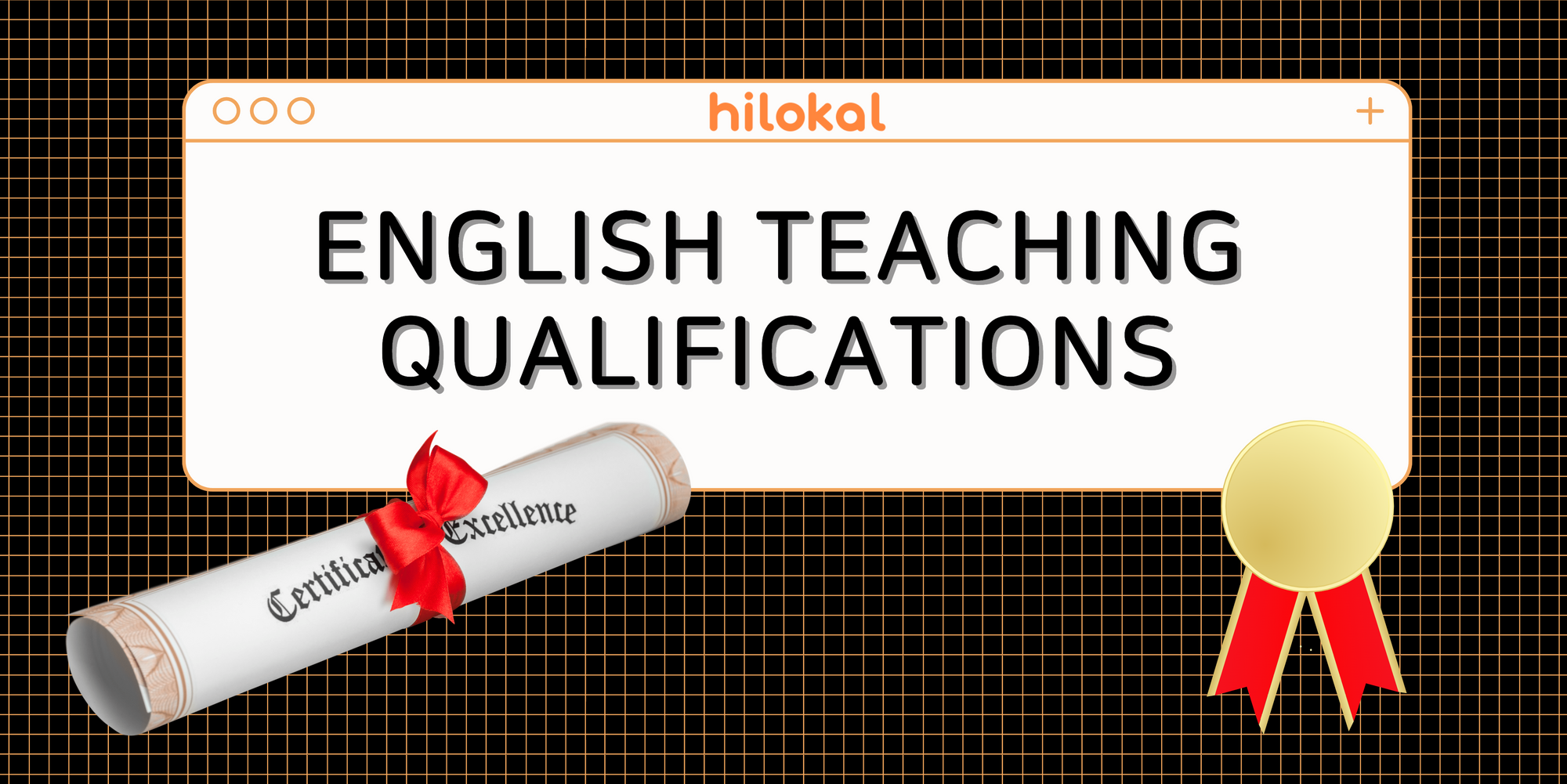Introduction
So, you’ve decided to become an English teacher. That’s great! You’ve done some research, you’ve looked up strategies and resources, but you might still be wondering, what qualifications are necessary for online English teachers?
That's a a fantastic question—and you are not alone in asking it! Here is what you need to know about online English teacher qualifications.
Do you need certification?
Perhaps the most common question when it comes to teaching English is do I need certification in order to teach English online? Is it necessary to be a successful online English teacher?
Well, there’s good news! The answer is no, is not necessary for you to have a teaching certificate or formal teaching education in order to become an online English teacher. In fact, if you wanted to, you could start teaching English right now! Although having a certificate or some form of training can be a good way to prepare for online teaching, and does increase your credibility from the get-go, teaching English without formal teacher training is absolutely possible.
Teaching without certification
Now you may be wondering, if it’s possible to teach without a certificate or formal training, how do you get started? Here are some options!
Existing Platforms
There are a wide variety of platforms from which you can teach English without a teaching license or certificate. Some recommended examples of these include:
· Hilokal
· Cambly
· Preply
There are many more options with different teaching formats (i.e. group lessons, 1-on-1 tutoring) also available a quick search away.
Building Your Own Platform
Another way to teach online is through building your own teaching platform! There are many ways of doing this, but some examples include using Zoom or social media platforms such as YouTube or TikTok. This option is entirely possible and many people have great success with it. However, one note is that it tends to be more difficult to get started using this method than using an existing platform, and it often works out better if you have an established following on one or more social media platforms.
Other Options
While teaching on existing platforms or through social media platforms are the most common ways to start teaching English online, there are other methods and organizations that allow you to teach online without a degree. Some examples would include local nonprofits or ministries or even your local library. Organizations like these often have ESL components to their programs, either in person or online, and usually need teachers! (An important note: these types of teaching situations are often on a volunteer basis, and you may not receive any form of payment).
Building qualification without certification
So now you know you can teach without a certificate or degree, but how do you become “qualified” to teach without formal training?
Truthfully, by using these platforms or other similar ways of teaching online without a certificate, you will probably start without much of reputation—good or bad—and therefore will likely not have a large following or as much credibility at the beginning of your teaching journey.
Well, how can you build this qualification?
Platform Verification
There are multiple ways of boosting your credibility on the platform you are using. For example, on Hilokal trainers can be considered for verification if they have consistently been holding well-reviewed classes. If you receive verification on Hilokal it greatly increases your credibility on the platform and it gives your tables—and therefore you—an increase in both visibility and interested learners, making you more “qualified” as a trainer.
The same is true if you are teaching through a social media platform. Most platforms (i.e., YouTube, TikTok, Instagram) have verification levels that increase your credibility and visibility throughout the platform, making you seem more like the real deal
Prescreening
Most existing teaching platforms also have some kind of screening in place for people who want to teach, meaning that by getting through the screening you have already started boosting your credibility. Note, however, that this is not the case if you are teaching on social media, as almost anyone can make an account.
Social Media
If you are not already teaching through social media, another way to increase both your platform and your credibility as a teacher is through using social media to market yourself. If you are already comfortable using platforms like YouTube, Instagram, or TikTok, considering creating a professional teaching account. You can use these accounts to promote your classes, give small sample lessons from past classes so people know what they’re signing up for, and just let people get to know a little more about you before they join your classes.
Consistency
Although the above credibility boosters are all fine and dandy, one of the most important ways you can come across as more qualified is just by being consistent. If you are holding classes at the same time every week people begin to expect what’s coming from you, and will even work your classes into their daily or weekly schedule. By holding consistent, high-quality classes and gaining committed, regular students and learners in your classes, you will gain a huge amount of experience that you can use as your qualification in bios or on resumes.
But what if you DO want a certificate?
If you’ve decided that you do want to pursue certification in English teaching, that’s awesome! But how do you know which type of certification is right for you? Why are there so many different types of certifications? How do you know which one is the best?
There is a multitude of online certifications and degrees to choose from when searching for them online and it can be hard to narrow down what’s useful in your situation. Here is a quick break down!
Certification vs Teaching license vs Degree
There are a few different ways you can go about getting professional training or certification in the field of English teaching. The first would be getting an English teaching certificate such a TESOL or TEFL certificate. The second is getting a teaching degree. And the third is getting a degree in English Education through a college or university.
Certificates
Common Certification: TESOL vs TEFL
If you want to go the route of an English teaching certificate, the most common two certificates people get are the TESOL certificate or the TEFL certificate, which are very similar but with one notable difference.
TESOL
TESOL stands for Teaching English to Speakers of Other Languages. This certificate is useful for teaching English to English language learners in either an English-speaking country or abroad. However, this certificate is most often used for teaching English to students who are abroad in an English speaking country.
TEFL
TEFL stands for Teaching English as a Foreign Language. The subtle difference in TEFL from TESOL is that TEFL certification is specifically for people who want to teach English in a non-English speaking country. In other words, you would be going abroad to teach.
In short, the difference between the two depends on your desired career path. If you want to stay in an English-speaking country to teach English, then you can stick with TESOL. If you know you want to teach abroad then go with TEFL.
Because these two certificates are very popular, you can also find access to TESOL and TEFL training online that will get you certified in no time. Although you do have to pay for this, you can do the training completely online through services such as the Oxford Seminars. Many colleges and universities also have short year or semester long training available for TESOL and TEFL certification that do not require you to be enrolled in another degree program in order to take the certification courses.
Other Types of Training and Certification
There are, of course, other types of English teaching certificates, and other English teacher training programs. There are many other English teaching certificates such as CELTA that are similar to TESOL/TEFL but more country specific. Other certification courses are specific to certain teaching areas, such as online teaching or business English. These courses are offered in multiple places online, such as iTTT Courses.
Teaching Licenses
Although these certificates are generally considered sufficient for platforms or organisations that require some form of formal training, another option for boosting your credibility to potential online employers is with a teaching license.
You can usually get a teaching license through a nearby college or university with or without another degree. One important note for teaching licenses is that the requirements for a teaching license change depending on the country and even by state or province. These licenses are also not necessarily transferable between state or province, but since online teaching can be done from anywhere, any area’s teaching license should be enough.
United States
In the United States, the requirements for a teaching license change by state Some states do recognize teaching licenses from other states even if the requirements don’t exactly match.
Canada
Similarly, Canada’s teaching license requirements change by province. (A note for those who are in Quebec: French language proficiency may be required for a teaching license).
United Kingdom
Again, in the United Kingdom there are slightly different requirements by country for those who want to teach in England.
Australia
Teach licenses also change by territory in Australia, but do have some general requirements, regardless of area.
Other Notes
While teaching licenses can be beneficial and give you more teaching qualification, it is worth noting that there are often courses or training that may be required to maintain the license. Teaching licenses also tend to focus on in person classrooms and therefore are sometimes only available in person or with a practical component that would require in person work. Although this can be good experience, it is not always applicable to online teachers.
Degrees
The final option for increasing qualification for teaching online English is through having a degree in English Education. The options for this will vary greatly based on where you live and what colleges and universities are available to you. But if you know teaching English is what you want to spend your time doing, it is certainly worth searching for a degree!
However, most English teaching platforms and employers that focus on English as a second language are not picky about what your degree is in, as long as you are a native speaker and have some kind of teaching training or experience.
Let's Recap!
The answer to the question of whether formal certification or training is needed to teach English is a resounding no! That means you can go teach English starting right now (after you finish reading this of course).
If you have no previous experience teaching English, it can be difficult to get going with no visible qualifications like a certificate or years of experience. Not to worry! Platform verification and prescreening, as well as consistency and making your classes visible through social media can boost your credibility in no time.
If you do want a certificate, license, or degree, do not fear! All are readily available in a variety of formats, either online or in person. TESOL and TEFL certificates are available for anyone to access online, and teaching licenses and English Education degrees are available either online or in person depending on your location. Just be sure to check the specific requirements for your area when thinking about a teaching license!
So, what are you waiting for? Get out there and start teaching!



